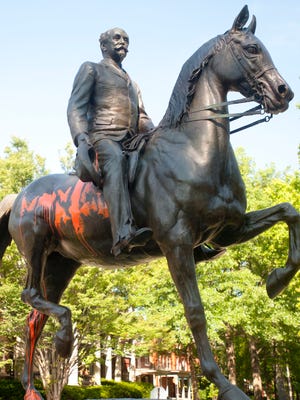Remove Cherokee Triangle statue of Confederate officer, group says
 Thomas Novelly
Thomas Novelly
Outrage over a Confederate statue in Cherokee Triangle is growing stronger.
Following a violent white supremacy rally in Charlottesville, Virginia on Saturday, a local anti-racism group is calling for the immediate removal of a more than 100-year-old statue of John B. Castleman, a Civil War officer who was a longtime president of the city's Board of Park Commissioners.
"We can't let longstanding symbols of racism be used as decorations in our neighborhoods," said Carla Wallace, a founding member of Showing Up For Racial Justice.
A day after orange paint was discovered on the 15-foot bronze statue, the group is holding an event at 6 p.m. Monday to raise awareness and protest Castleman's monument.
Background:Cherokee Triangle statue of Confederate officer vandalized
On Sunday, Mayor Greg Fischer asked the public art commission to review the city's art inventory and develop a list of those potentially tied to racism and slavery. He said the "review is in preparation for a community conversation about their display."
Fischer spokesman Chris Poynter said Sunday that the mayor isn't advocating for any particular statue to be removed and that the plan could include adding context to pieces with a "complicated history."
Poynter said Monday that a representative from the mayor's office will be at the event.
"We have a process to do this," Poynter said. "The commission will continue to engage the public on this because there are a lot of opinions over it."
More:Police presence 'disturbing and antagonistic' at rally, group says
Wallace said there shouldn't be a delay or any debate about removing the statue.
"Many don't know the history behind the Castleman statue, but Mayor Fischer does," Wallace said. "There's no debate. It's a monument to a Confederate soldier."
The statue was built in 1913, several years before his death, to recognize Castleman's contributions to the neighborhood. He is seen wearing equestrian clothes because he helped found the American Saddlebred Horse Association in 1891.
Castleman was a major in the Confederate army and later a brigadier general in the U.S. Army. After the Civil War, Castleman graduated from University of Louisville Law School; half of the land he purchased for his estate was later used to develop the Tyler Park neighborhood. He is buried in Cave Hill Cemetery.
Consider this:Learn more about John Castleman and his contributions to Louisville
According to the historical marker, Castleman "led an attempt in 1864 to free Confederate prisoners at Camp Morton. He was imprisoned until the end of the war, exiled, then pardoned by President [Andrew] Johnson."
According to a recent op-ed in the Courier-Journal, Castleman once saw a group of African Americans playing tennis in Cherokee Park and responded by segregating the tennis courts.
“These people are citizens,” he said in a 1916 Courier-Journal article. “The same right that induces our liberal provision for their separate education should impel us to provide for them separate recreation grounds.”
In April 2016, the city removed and dismantled a 121-year-old Confederate monument on the University of Louisville's Belknap campus. The monument was relocated to Brandenburg, Kentucky, a small Ohio River town about 45 miles away from Louisville. The town wants to use it as part of Civil War reenactment events.
Showing Up For Racial Justice has started an online petition that has more than 1,200 signatures calling for the statue's removal, Wallace said.
"I just don't think there can be any debate about racism," Wallace said. "Plain and simple."
Reach Reporter Thomas Novelly at 502-582-4465 or by email at tnovelly@courier-journal.com. Follow him on twitter @TomNovelly.